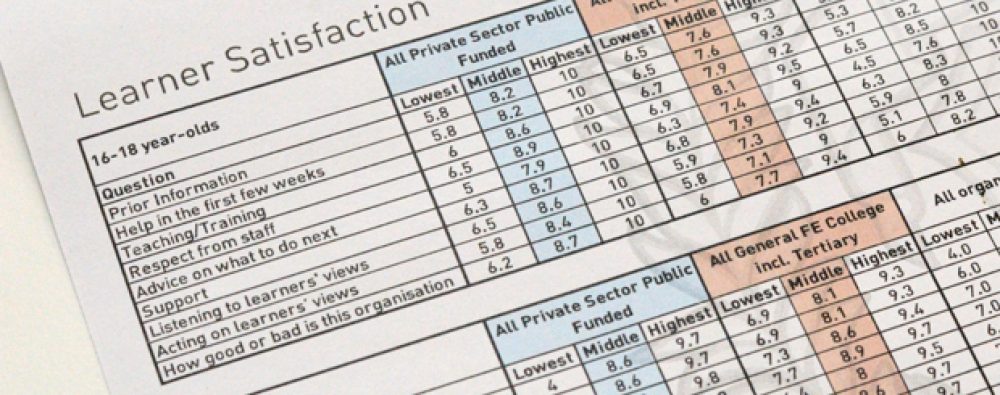Private providers ahead of FE colleges in government learner satisfaction survey.
Learners think private training providers listen and respond to their views better than general FE colleges, according to analysis by FE Week.
Private training providers outscored colleges in every category of the learner satisfaction survey, published online in the ‘FE Choices Publication of Outputs’, formerly known as the Framework for Excellence, by the Skills Funding Agency (SFA).
“Undoubtedly the ratings for independent providers are encouraging,” a spokesperson for the Association of Employment and Learning Providers (AELP) said.
“The high turn-out of our members at quality improvements events that AELP organises regularly across the regions in partnership with the likes of Ofsted and LSIS demonstrates that there is a real appetite out there to deliver a better service to both learners and employers.”
The biggest difference in views were for the learner satisfaction categories titled “listening to learners’ views” and “acting on learners’ views”. Private training providers had an average score that was 11 per cent higher than general FE colleges in both categories, based on learners at all age groups.
In particular, private training providers received a satisfaction score that was 13 per cent higher for learners aged between 16 and 18.
The AELP spokesperson added: “The ability to be flexible in response to employer and learner needs is certainly a hallmark of the provision that independent providers are offering. Learners also appreciate the close links that our members have developed with local employers, which obviously counts for a lot in the current economic climate.”
Learners aged between 16 and 18 gave private training providers a rating 10 per cent higher than FE colleges based on “how good or bad” they thought they were as an organisation.
In the same category, respondents at all ages gave private training providers a rating seven per cent higher than FE colleges.
A spokesperson for the Association of Colleges (AoC) told FE Week: “Colleges take the views of their students very seriously, indeed they run their own internal student satisfaction surveys throughout the year to garner such views.”
“The feedback information available on ‘FE Choices’ is another source of helpful information that can be used by our member colleges and other training providers and we know that individual colleges will be examining the data and thinking about how to further enhance their student experience, or satisfaction levels.”
The spokesperson added: “However, a single satisfaction score never tells the full story and does not provide a truly meaningful measurement.
“Great care needs to be taken when making comparisons of this nature, as FE Week are doing, as there are so many variables at play; for example, general further education colleges teach and train thousands of students of all different ages on a wide variety of courses, yet they may be being compared here with all training providers, some of which may only train small groups of 35 people.”
Learners rated private training providers eight per cent higher than FE colleges based on the “support” they were given on the programme.
Toni Pearce, vice president (Further Education) at the National Union of Students (NUS), said: “I think it’s important to take care when looking at these results, particularly when looking at the differences between different types of providers.
“The difference between private providers and colleges is not entirely surprising, as numbers and experiences between the two are often not comparable.
“It looks as though experiences of learners at colleges do appear to be more consistent.”
Learner satisfaction is a performance measure released as part of ‘FE Choices’ and based on a questionnaire of learners’ views.
Questions include the amount of information, advice and guidance given by a provider, the quality of teaching and learning and the learner’s overall satisfaction with the programme.
Geoff Russell, chief executive of the SFA, said: “The publication of FE Choices is an important feature of the government’s approach to working in partnership with the sector to develop a new sector-led FE Public Information framework.”
Private training providers also outscored general FE colleges in the employment rate data published in ‘FE Choices’.
The employment rate, the proportion of learners who completed a LSC-funded programme in 2008/09 and then entered employment by 2009/10, was on average 20 per cent higher in private training providers than in general FE colleges.
Questions have also been raised about the quality of the data published in the ‘FE Choices Publication of Outputs’.
Elmfield Training received an average employer satisfaction rating of 2.8 out of 10, despite receiving a seven for “Likelihood to recommend this organisation”.
A spokesperson for Elmfield Training said: “On reviewing the detailed information on the gateway we believe there is a problem with the survey data. We have alerted the Skills Funding Agency to this anomaly. They have assured us they will look into the matter.”
Click here for FE Week’s analysis of the numbers









Your thoughts